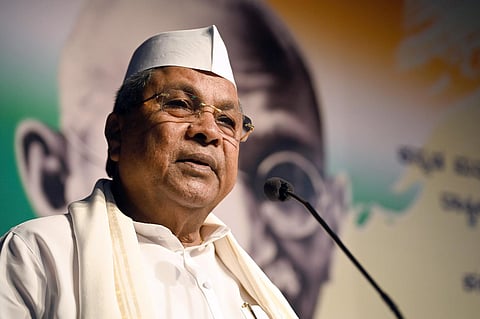

BENGALURU: The Karnataka High Court on Monday extended till September nine the interim stay on trial court proceedings against Chief Minister Siddaramaiah in connection with the alleged Mysuru Urban Development Authority (MUDA) case.
The court adjourned for a week the hearing on Chief Minister's petition challenging the legality of Governor Thaawarchand Gehlot's sanction for his prosecution in the case.
Appearing for the Respondent number 4 (R-4) Snehamayi Krishna, senior advocate K G Raghavan made submissions when the hearing resumed.
"Heard the learned senior counsel K G Raghavan, the learned Advocate General seeks a week's time to make his submissions. List the matter on September 9 at 2:30 pm. Interim order granted on August 19 shall continue till the next date of hearing," Justice M Nagaprasanna said.
The Governor on August 16 accorded sanction under Section 17A of the Prevention of Corruption Act, 1988 and Section 218 of the Bharatiya Nagarik Suraksha Sanhita, 2023 for the commission of the alleged offences as mentioned in the petitions of Pradeep Kumar S P, T J Abraham and Snehamayi Krishna.
On August 19, Siddaramaiah moved to the High Court challenging the legality of the Governor's order.
In the petition, the Chief Minister submitted that the sanction order was issued without due application of mind, in violation of statutory mandates, and contrary to constitutional principles, including the advice of the Council of Ministers, which is binding under Article 163 of the Constitution of India.
Siddaramaiah sought quashing of the Governor's order contending that his decision is legally unsustainable, procedurally flawed, and motivated by extraneous considerations.
Making his submission, Raghavan said philosophy of Prevention of Corruption Act is: "do not use your public office to obtain an advantage, legal or illegal."
He said: "...even if you have used personal influence not necessarily as a boss, it comes within the mischief of Section 7 of the PC Act....the moment you hold a public office it carries with it certain obligations and dos and don'ts which are not attached to a non-public office. So, therefore even if you are not directly connected, but if you have used your personal influence over a particular matter in respect of which a decision has been taken and you are a beneficiary, that itself constitutes an offence."
He requested the court not to look at the sanction under section 17 A of the Prevention of Corruption act as an adversarial but from the point of view of ensuring probity in public administration, and to ensure that the public confidence in administration -- if damaged or eroded -- is restored.
At this point, the judge asked where has the public confidence in administration eroded? To this, Raghavan said: "the very fact that the commission of inquiry has been constituted, under the commission of inquiry act, itself indicates that there is an anxiety to get this matter inquired into, and it is a matter of public importance.....It has been referred to by the Governor in his order..."
The Congress government on July 14 constituted a single member inquiry commission under former High Court Judge Justice P N Desai to probe the MUDA 'scam'.
The judge then asked: "if something is being inquired into then why this exercise (sanction for prosecution)?" Responding to this, Raghavan said, "they are parallel remedies.... "
Raghavan further said that "the fact that the government itself considers there should be an inquiry into this matter, and the matter of public importance itself indicates that there is something that is required to be inquired into...the entire allegations are with respect to persons holding public office."
"In matters of this kind, the courts must lean in favour of getting matters inquired," he submitted.
He also claimed that Siddaramaiah was Chief Minister or Deputy Chief Minister when most of the developments such as denotification of the 3.16 acres of land in question took place.
In the MUDA 'scam', it is alleged that compensatory sites were allotted to Siddaramaiah's wife B M Parvathi in an upmarket area in Mysuru, which had higher property value as compared to the location of her land which had been "acquired" by the MUDA.
The MUDA had allotted plots to Parvathi under a 50:50 ratio scheme in lieu of 3.16 acres of her land, where MUDA developed a residential layout.
Under the controversial scheme, MUDA allotted 50 per cent of developed land to the land losers in lieu of undeveloped land acquired from them for forming residential layouts. Opposition and some activists have also claimed that Parvathi had no legal title over this 3.16 acres of land.